2020人教版(青岛)八年级上册Unit 1 Where did you go on vacation? Section A预习课件 (共63张PPT)
文档属性
| 名称 | 2020人教版(青岛)八年级上册Unit 1 Where did you go on vacation? Section A预习课件 (共63张PPT) | 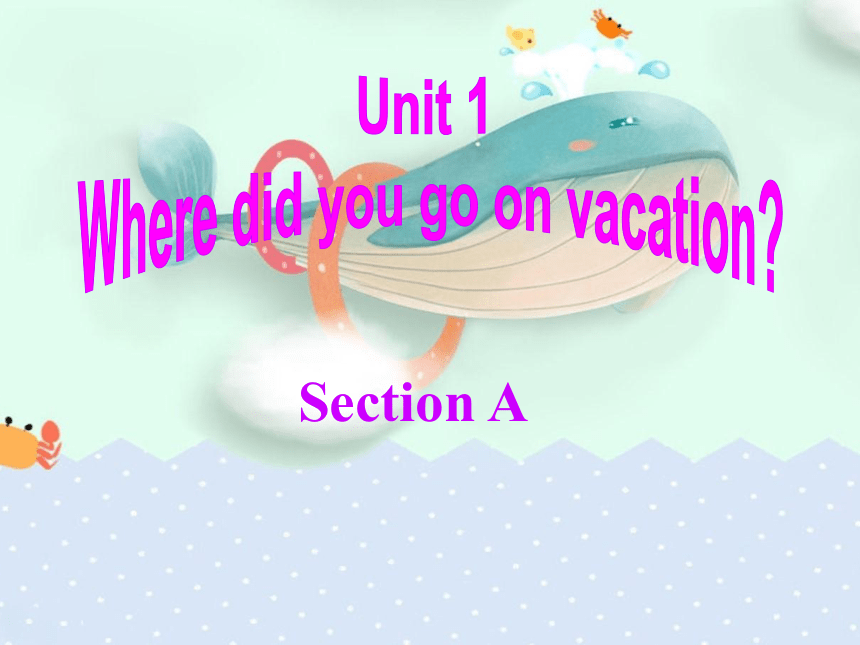 | |
| 格式 | zip | ||
| 文件大小 | 1.2MB | ||
| 资源类型 | 教案 | ||
| 版本资源 | 人教新目标(Go for it)版 | ||
| 科目 | 英语 | ||
| 更新时间 | 2020-09-06 09:29:29 | ||
图片预览

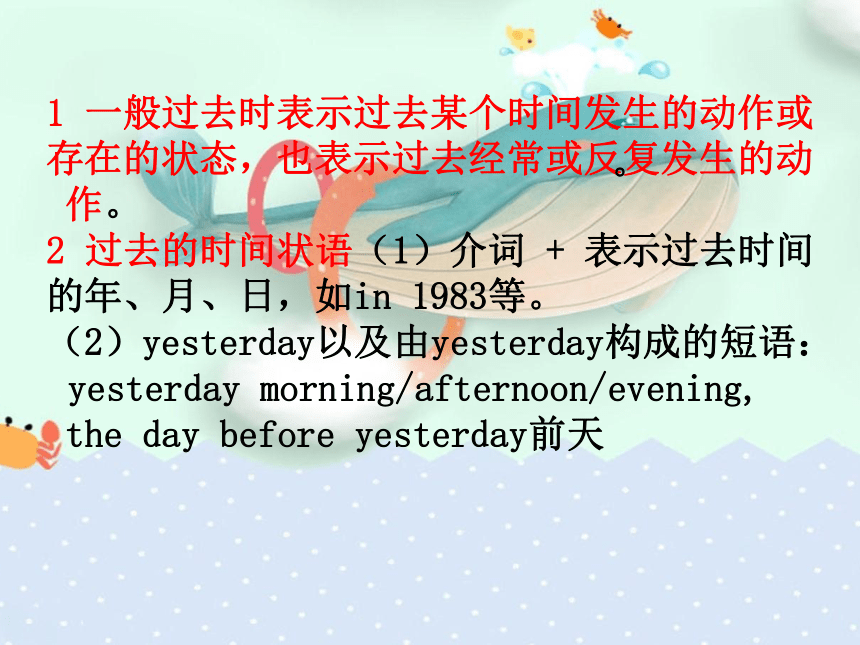
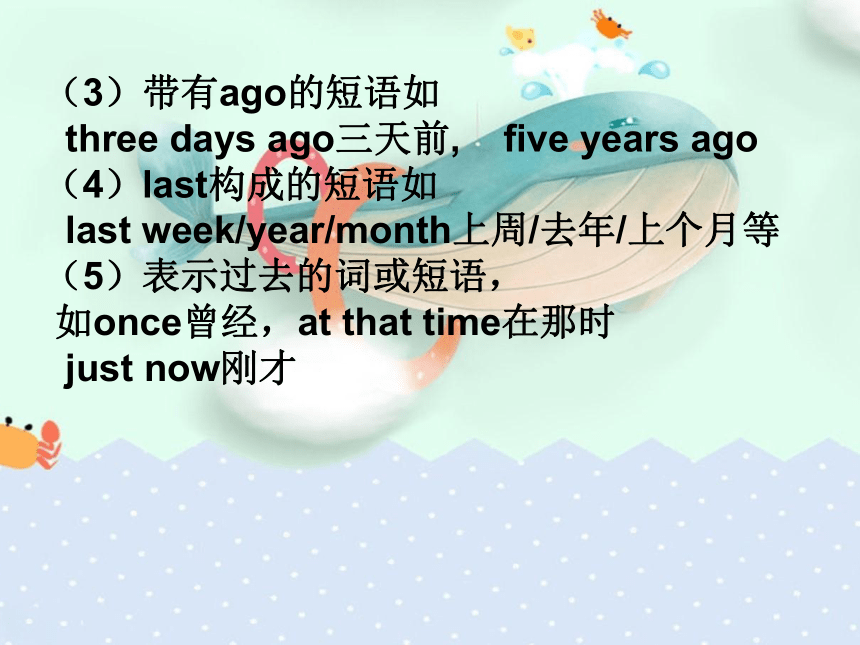
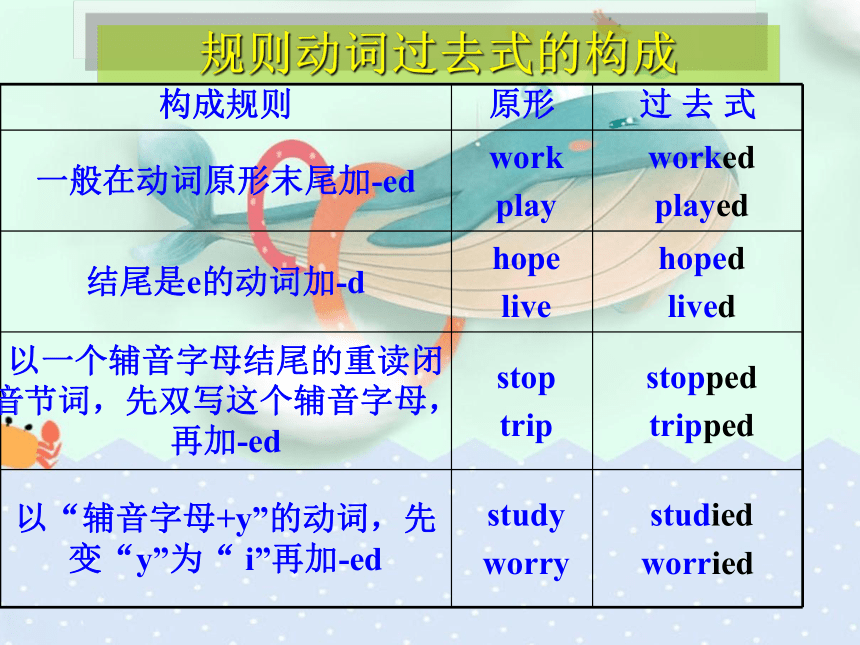
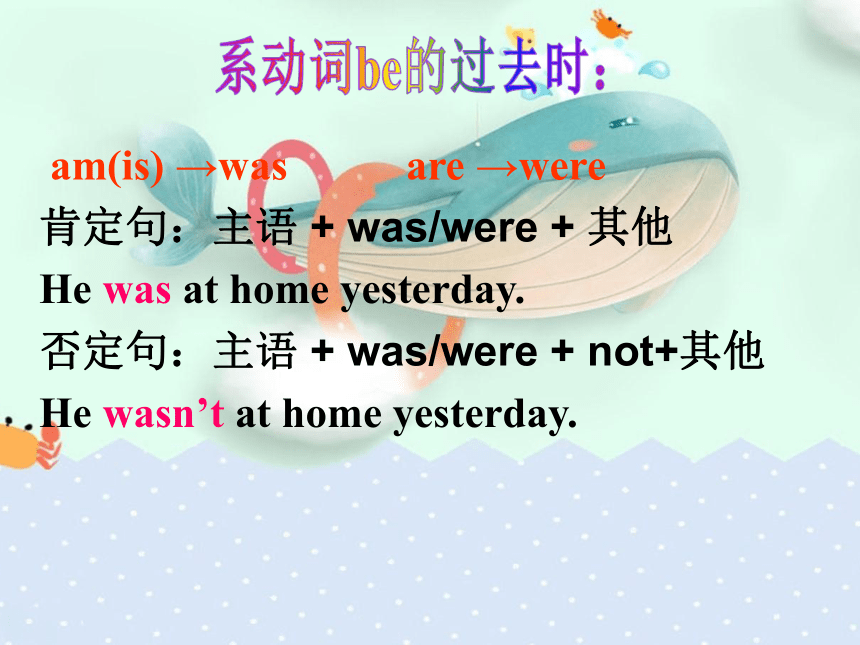
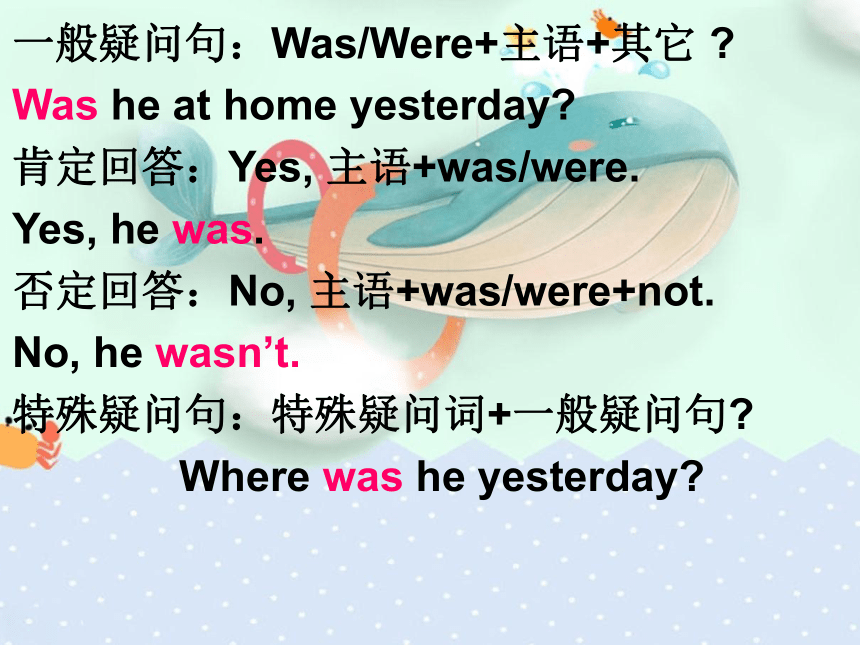
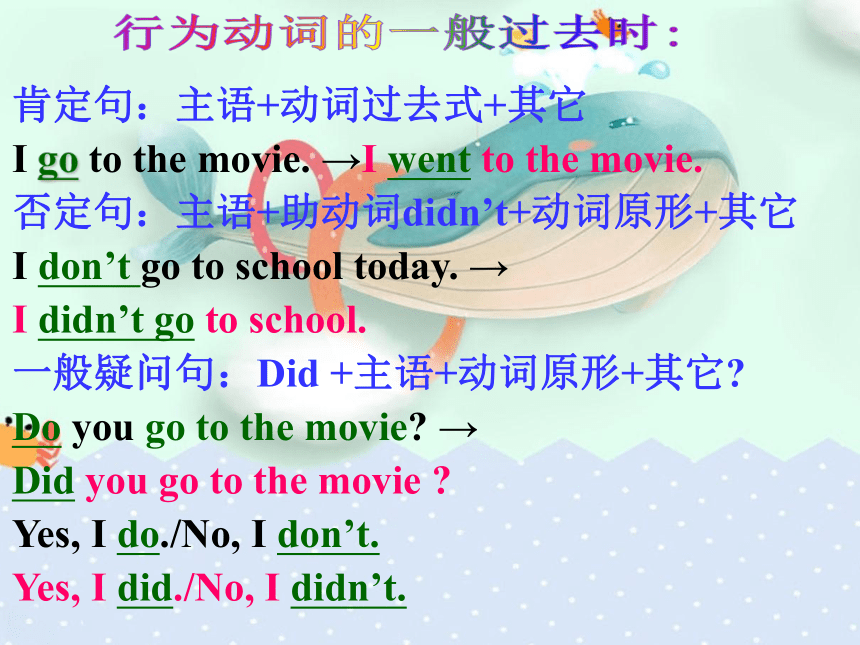
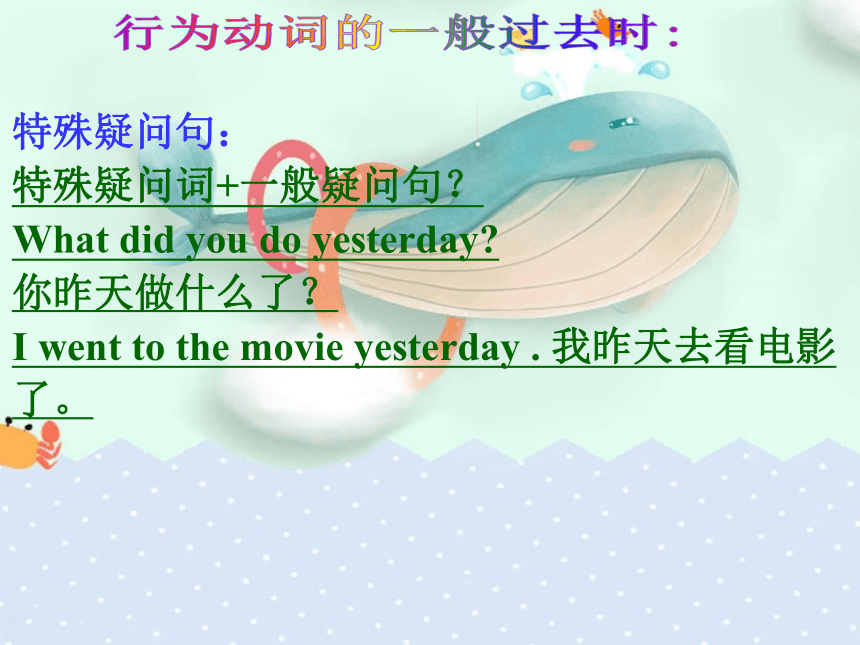
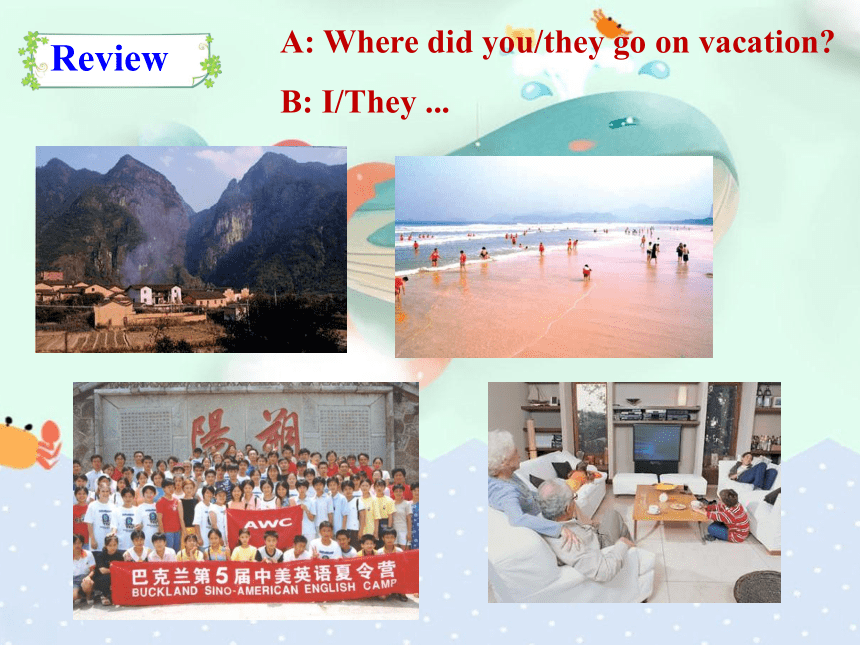
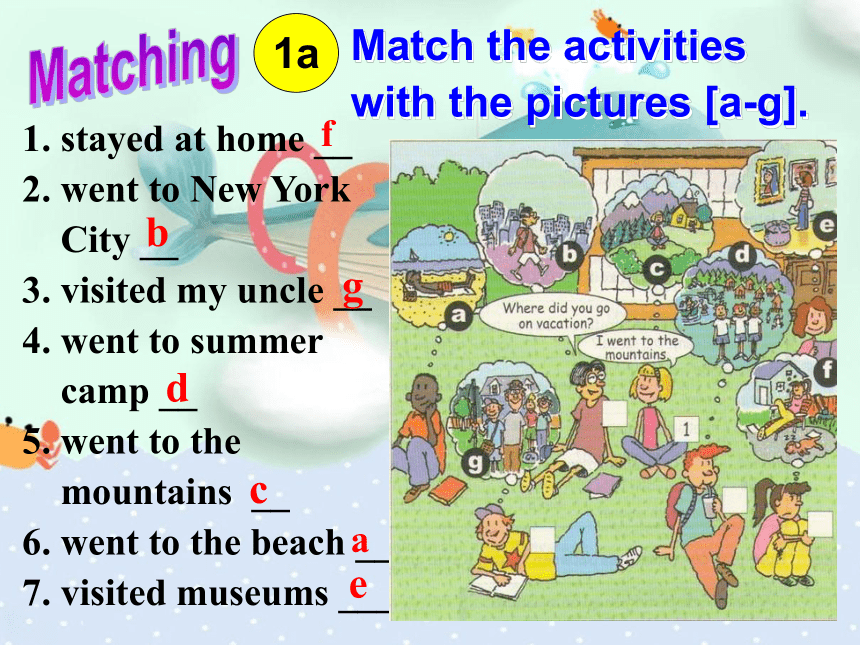

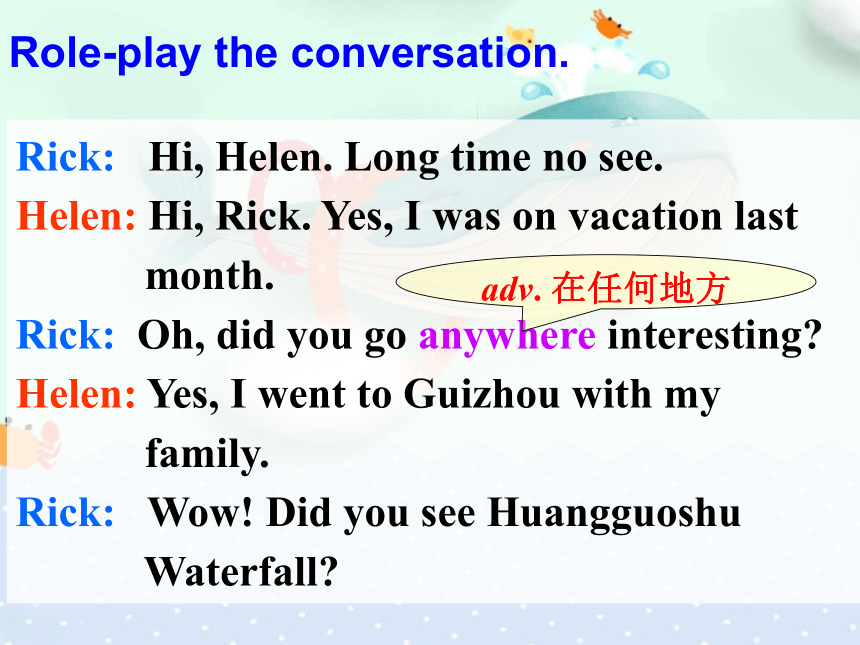
文档简介
(共64张PPT)
Unit
1
Where
did
you
go
on
vacation?
Section
A
1
一般过去时表示过去某个时间发生的动作或
存在的状态,也表示过去经常或反复发生的动
作。
2
过去的时间状语(1)介词
+
表示过去时间
的年、月、日,如in
1983等。
(2)yesterday以及由yesterday构成的短语:yesterday
morning/afternoon/evening,
the
day
before
yesterday前天
。
(3)带有ago的短语如
three
days
ago三天前,
five
years
ago
(4)last构成的短语如
last
week/year/month上周/去年/上个月等
(5)表示过去的词或短语,
如once曾经,at
that
time在那时
just
now刚才
规则动词过去式的构成
构成规则
原形
过
去
式
一般在动词原形末尾加-ed
work
play
worked
played
结尾是e的动词加-d
hope
live
hoped
lived
以一个辅音字母结尾的重读闭音节词,先双写这个辅音字母,再加-ed
stop
trip
stopped
tripped
以“辅音字母+y”的动词,先变“y”为“
i”再加-ed
study
worry
studied
worried
am(is)
→was
are
→were
肯定句:主语
+
was/were
+
其他
He
was
at
home
yesterday.
否定句:主语
+
was/were
+
not+其他
He
wasn’t
at
home
yesterday.
一般疑问句:Was/Were+主语+其它
?
Was
he
at
home
yesterday?
肯定回答:Yes,
主语+was/were.
Yes,
he
was.
否定回答:No,
主语+was/were+not.
No,
he
wasn’t.
特殊疑问句:特殊疑问词+一般疑问句?
Where
was
he
yesterday?
肯定句:主语+动词过去式+其它
I
go
to
the
movie.
→I
went
to
the
movie.
否定句:主语+助动词didn’t+动词原形+其它
I
don’t
go
to
school
today.
→
I
didn’t
go
to
school.
一般疑问句:Did
+主语+动词原形+其它?
Do
you
go
to
the
movie?
→
Did
you
go
to
the
movie
?
Yes,
I
do./No,
I
don’t.
Yes,
I
did./No,
I
didn’t.
特殊疑问句:
特殊疑问词+一般疑问句?
What
did
you
do
yesterday?
你昨天做什么了?
I
went
to
the
movie
yesterday
.
我昨天去看电影了。
Review
A:
Where
did
you/they
go
on
vacation?
B:
I/They
...
Matching
1.
stayed
at
home
__
2.
went
to
New
York
City
__
3.
visited
my
uncle
__
4.
went
to
summer
camp
__
5.
went
to
the
mountains
__
6.
went
to
the
beach
__
7.
visited
museums
___
b
d
c
g
a
e
Match
the
activities
with
the
pictures
[a-g].
1a
f
visit
动词1拜访,看望,
后接表示人的名词或代词。
2参观,游览,后接表示地点的名词。
visit名词意为
“访问,参观,拜访"
my
first
visit
to
China
第一次到中国参观
visitor
参观者,游客
Role-play
the
conversation.
Rick:
Hi,
Helen.
Long
time
no
see.
Helen:
Hi,
Rick.
Yes,
I
was
on
vacation
last
month.
Rick:
Oh,
did
you
go
anywhere
interesting?
Helen:
Yes,
I
went
to
Guizhou
with
my
family.
Rick:
Wow!
Did
you
see
Huangguoshu
Waterfall?
adv.
在任何地方
Helen:
Yes,
I
did.
It
was
wonderful!
We
took
quite
a
few
photos
there.
What
about
you?
Did
you
do
anything
special
last
month?
Rick:
Not
really.
I
just
stayed
at
home
most
of
the
time
to
read
and
relax.
adj.
精彩的;绝妙的
adj.
&
pron.
不多;很少
相当多;不少
special
adj.
特殊的,专门的
.
special
n.
特色菜,特殊的人,专车
Long
time
no
see
.
好久不见
go
on
a
vacation
去度假
be
on
vacation
在度假
quite
a
few
不少,相当多
most
of
the
time
意为“大部分时间”,其most为代词,意为“大部分,大多数,大体上”
most
of…意为“…中的大多数”,做主语时,谓语动词取决于most
of后所修饰的名词。
Most
of
us
are
going
to
the
park.
我们大多数人要去公园。
Most
of
the
food
goes
bad.
大部分的食物变质了。
taste
尝起来+adj
每样东西尝起来真的很美味。
Everything
tasted
really
good。
be
excellent
in
sth.
表示在…….方面极好
I
am
excellent
in
English.
我在英语方面很优秀。
have
a
good
time=enjoy
oneself
=have
fun
+
v.ing
玩的开心,过的愉快
few、a
few、little、a
little的区别和联系:
few
/
a
few用来修饰可数名词,
few表示否定意义,没有,几乎没有;
a
few表示有肯定意思,有几个。
例如:
He
has
___________
here.
He
feels
lonely.
他这里没朋友。他感觉寂寞。
There
are
___________
in
the
basket.
篮子里有几个鸡蛋.
a
few
eggs
few
friends
little
/
a
little用来修饰不可数名词,
little表示否定意思,没有,几乎没有。
a
little
表示肯定意思,有一点儿。
例如:
There
is
________
ink
in
my
bottle.
Can
you
give
me
_________
ink?
我的瓶子里没有墨水了,
你能给我点儿墨水吗?
little
a
little
一点
a
little
=a
bit
of
+不可数名词原形
有点儿,稍微a
little=a
bit=a
little
bit=kind
of
后加形容词
一个小的
a
little+可数名词单数
【牛刀小试】
—Is
your
friend
Michael
still
in
Australia?
—I
don’t
know.
I
have
________
information
about
him
because
we
haven’t
seen
each
other
for
________
years.
A.
a
little;
a
few
B.
little;
a
few
C.
a
few;
that
D.
few;
a
little
all全体,全部
both两个(都)
none没人或物(指三个或三个以上)
neither没人或物(指两个当中)
either任何一个(指两个当中)
each每个
every每个
everybody每人,大家,人人
everyone每人
everything每一件事,一切
other(s)另一个(些)
another另外一个,又一个
much很多
many很多
few很少
a
few一些,几个
little很少
a
little一些
one一个
某人
某事
任何人
任何事
没有人
没有东西
每人
一切
1.
some,
any,
no,
every与-one,
-thing可以
组成八个不定代词,他们分别是:
someone
复合不定代词小结:
anyone
no
one
everyone
something
anything
nothing
everything
2.
带some的复合不定代词常用于肯定句
中;带any的复合不定代词常用于否定
句或一般疑问句中。例如:
我想吃点东西。
I’d
like
___________
to
eat.
今天有人给我打电话吗?
Did
________
call
me
today?
anyone
something
3.
当形容词修饰不定代词时,应放在其
后面。例如:
这本书里有什么新东西吗?
Is
there
_________
_____
in
this
book?
今天没有什么特别的事。
There’s
_________
________
today.
anything
new
nothing
special
不定代词+形容词
something
interesting
4.
由some,
any,
no,
every构成的复合不定代词
作主语时,都作单数看待,其谓语动词用单数第三人称形式。例如:
Something
is
wrong
with
my
watch.
Well,
everyone
wants
to
win.
Nobody
knows
what
the
future
will
be
like.
There
is
something
for
everyone
in
the
shop.
5.
除no
one以外,其他复合不定代词都写成一个词。
New
words
something
nothing
everyone
of
course
myself
yourself/
yourselves
hen
pig
seem
bored
someone
diary
某事;某物
没有一件东西;没什么
每人;人人;所有人
当然;自然
我自己;我本人
你/您自己/
你/
您们自己
母鸡
猪
好像;似乎;看来
厌倦的;烦闷的
某人
日记;记事簿
go
with
someone?????
go
out
with
someone
go
to
New
York
City
buy
something
special
meet
someone
interesting??
study
for
do
something
interesting
go
to
Central
Park
long
time
no
see
be
on
vacation
1.和某人一起走
2.和某人一起出去
3.去纽约
4.买一些不寻常的东西
5.见一些有趣的人
6.为…而学习
7.做一些有趣的事
8.去中心公园
9.好久不
见
10.在度假
go
to
…with
my
family
go
somewhere
interesting
Huangguoshu
Waterfall
quite
a
few
do
something
special
most
of
the
time
stay
at
home
1.和家人去…
2.去有趣的地方
3.黄果树瀑布
4.相当多,不少
5.做些特别的事情
6.大部分时间
7.呆在家里
8.当然
9.似乎很厌倦
10.写日记
of
course
seem
to
be
bored
keep
a
diary
3a
Fill
in
the
blanks
with
the
words
in
the
box
and
practice
the
conversation.
anyone,
something,
anything,
everything,
nothing
Linda:
Did
you
do
_________
fun
on
your
vacation,
Alice?
Alice:
Yes,
I
did.
I
went
to
Sanya.
Linda:
How
did
you
like
it?
Alice:
Well,
it
was
my
first
time
there,
so
__________
was
really
interesting.
anything
everything
Linda:
Did
you
go
with
________?
Alice:
Yes,
I
did.
I
went
with
my
sister.
Linda:
Did
you
go
shopping?
anyone
Alice:
Of
course!
I
bought
_________
for
my
parents,
but
________
for
myself.
Linda:
Why
didn’t
you
buy
________
for
yourself
?
Alice:
I
didn’t
really
see
________
I
like.
something
nothing
anything
anything
1.
I
can’t
hear
anything
=
I
can
hear
_________.
2.
There
is
__________
on
the
floor.
Please
pick
it
up.
3.
Did
_____
go
to
play
basketball
with
you
?
4.
I
phoned
you
last
night,
but
________
answered
it.
5.
I
don’t
think
___________
telephoned.
9.
Don’t
worry.
There’s
______
wrong
with
your
ears.
10.
There’s
__________
in
the
box.
It’s
empty.
11.
Maybe
__________
put
my
pencil
_________.
I
can’t
find
it
___________.
巩固练习:用不定代词或不定副词填空
nothing
something
anyone
no
one
anyone
nothing
nothing
someone
somewhere
anywhere
anyone
任何人=anybody,叫不定代词,
与单数谓语动词连用,常用于疑问句和否定句中。
any
one
指某些人或事物中的任何一个,
常与of
短语连用。作主语,谓语动词用单数。
Any
one
of
the
books
is
interesting.
这些书中任何一本都有趣。
Explanation
1.
myself
(我自己)
,yourself
(你自己)是反身代词。表示“某人自己的词”叫反身
代词。
myself
yourself
himself
herself
itself
我自己
你自己
他自己
她自己
它自己
ourselves
yourselves
themselves
我们自己
你们自己
他们自己
(1).
Did
you
buy
anything
for
yourself?
你为你自己买什么东西了吗?
(2).
The
old
man
taught
himself
English.
那位老人自学英语。
(3).
I
myself
visited
my
aunt
last
weekend.
我自己去拜访了我的姑姑。
2.
How
do
you
like
it
?
=
What
do
you
think
of
it?
你认为这本书怎么样?
Howdo
you
like
this
/
the
book
?
=
What
do
you
think
of
this
/
the
book
?
teach
oneself
自学
=learn
by
oneself自学
enjoy
oneself
玩的开心,过的愉快
help
oneself
to
随便
3.
Well,
it
was
my
first
time
there.
噢,这是我第一次去那儿。
比较:
Sunday
is
the
first
day
of
the
week.
It
was
my
first
time
to
the
museum.
time
表时间,是不可数名词。
How
time
flies!
表次数,是可数名词。
How
many
times
did
you
go
there?
4.
of
course
5.
I
bought
something
for
my
parents,
but
nothing
for
myself.
我给父母买了一些东西,但给自己什么也没买。
6.I
didn’t
really
see
anything
I
liked.
我其实没有看见我喜欢的东西。
当然
anything,
everything,
nothing,
everyone,
no
one
Fill
in
the
blanks
in
the
email
message
with
the
words
in
the
box.
3b
Dear
Bill,
How
was
your
vacation?
Did
you
do
_______
interesting?
Did
________
in
your
family
go
with
you?
I
went
to
a
friend’s
farm
in
the
countryside
with
my
family.
_________
was
great.
We
fed
some
hens
and
saw
some
baby
pigs.
They
were
so
cute!
The
only
problem
was
that
there
was
_______
much
to
do
in
the
evening
but
read.
Still
_______
seemed
to
be
bored.
Bye
for
now.
anything
Everything
anyone
nothing
no
one
(1)feed
-过去式fed-过去分词fed
(2)
feed…on…
以…为食
We
feed
the
dog
on
bones
我们喂狗骨头。
(3)把……喂给……
feed
……to……
I
feed
the
grapes
to
my
daughter
.
我把葡萄喂给我女儿。
我经常喂我的宠物
The
only
problem
was
that
there
was
nothing
much
to
do
in
the
evening
but
read.
nothing
much
to
do
没什么事可做
nothing…but…除……之外什么也没有,只有。
but后可接名词或动词原形
I
had
nothing
but
a
cup
of
tea
this
morning.
我今天早上只喝了杯茶。
seem是系动词,意为“
似乎;好像”,其用法如下:
a.
seem
+(to
be
)名词/形容词(作表语)
He
seems
to
be
happy.
b.
seem
+to
do
sth.
The
students
seemed
to
know
the
word.
c.
It
seems
that从句。
It
seems
that
he
is
happy.
Ask
your
group
questions
about
their
last
vacation.
Then
tell
the
class
your
results.
Did
you…
Everyone
Someone
(name)
No
one
Eat
anything
at
a
restaurant?
Read
anything
interesting?
Visit
anyone
in
your
family?
Buy
anything?
Keep
a
diary?
3c
1.
I’m?sorry?I?know?_____?about?it.?
It’s?a?secret?between?them.???(2016重庆)
?
A.?nothing?????B.?something????
C.?anything?????D.?everything?
句意:对不起我不知道关于那件的事情,那是他们之间的秘密。根据It’s
a
secret?between?them可知,既然是他们之间的秘密,所以应该指的是不知道。
A
中考链接
2.
There?is?_____?wrong?with?my?back?
and?it?hurts?seriously.
?(2015长沙)????
A.
anything????????B.
something???????
C.
nothing
B
3.
—Come?here.
I’ll?tell?you?_______
about?your?study.??????????
—OK.
We’re?coming.(2015铜仁)
A.
anything?important??????
B.
something?important??????????
C.
important?anything???????
D.
important?something?
B
4.
—Wow,
so?many?new?buildings?in?
our?hometown!??????????
—Yes.
_____?has?changed?in?our?
hometown.
???(2015盐城)
A.
Nothing???????????
B.
Nobody??????????
C.
Everything?????????D.
Everybody
C
5.?—Smoking?brings?me?a?lot?of?ideas.
—Stop?that!?After?all,
_____?is?more?
important?than?health.(2015南通)
A.
nothing?????????B.
something??????????
C.
anything????????D.
everything
A
6.
—What?about?doing
_____
for?the?
homeless?people???????????
—Good?idea!????????(2015·齐齐哈尔)?????
A.
anything?helpful?
B.
something?helpful?????????
C.
helpful?something
B
Language
points
1.
myself
(我自己)
,yourself
(你自己)是反
身代词。表示“某人自己的”词叫反身代
词。见下表:
myself
yourself
himself
herself
itself
我自己
你自己
他自己
她自己
它自己
ourselves
yourselves
themselves
我们自己
你们自己
他们自己
1)
Did
you
buy
anything
for
yourself?
你为你自己买什么东西了吗?(做介词宾语)
2)
The
old
man
taught
himself
English.
那位老人自学英语。(做动词宾语)
3)
The
thing
itself
is
not
important.
事情本身并不重要。(做同位语)
4)
I
myself
visited
my
aunt
last
weekend.
上周我自己去拜访了姑姑。(做同位语)
2.
How
did
you
like
it?
?
?
句型How
...
sb.
like
...?与What
...
sb.
think
of
...?同义,意为“某人觉得……怎么样?”。如:
How
do
you
like
the
TV
show?
=
____________________
the
TV
show?
你觉得这个电视节目怎么样?
What
do
you
think
of
3.
Still
no
one
seemed
to
be
bored.
seem意为“好像;似乎;看来”,其主要用法如下:
◆seem+
(to
be)
+
adj.
如:
The
movie
_______________________.
这部电影似乎很有趣。
◆seem
to
do
sth.
如:
The
boy
_____________
nothing
about
it.
这个男孩似乎对它一无所知。
seems
(to
be)
interesting
seems
to
know
◆It
seems
that
...
如:
It
seems
that
Mr.
Zhang
is
at
home.
张先生好像在家。
据汉语意思完成英语句子。
1)
这儿的衣服似乎很贵。
The
clothes
here
___________
very
expensive.
2)
他们似乎周六要去上海。
They
seem
_______
to
Shanghai
on
Saturday.
3)
好像今天她要开车去上班。
_____________
she’ll
drive
to
work
today.
seem
to
be
to
go?
It
seems
that
bored
boring与bored的用法区别
bored和boring是动词bore的两个形容词。bored表示
“感到厌烦的”,用来指人;boring表示“令人厌烦的
”,用来指物。
翻译下列句子
1)
这部电视剧很无聊。
2)
我很无聊。
The
TV
play
is
boring.
I
am
very
bored.
Exercise
1.
I
have
____
to
tell
you.
A.
anything
interesting
B.
something
interesting
C.
interesting
anything
D.
interesting
something
2.
The
light
in
the
room
still
on,
I
think
____
is
in
the
room.
A.
everyone
B.
anyone
C.
someone
3.
The
work
is
very
easy,
I
can
do
it
by
____.
A.
me
B.
my
C.
mine
D.
myself
4.
The
TV
show
is
very
____,
and
I
feel
____.
A.
boring,
bored
B.
boring,
boring
C.
bored,
bored
D.
bored,
boring
根据句意及所给汉语提示,写出所缺单词。
1.
We
didn't
see
any
______
(母鸡)
on
the
farm.
2.
There’re
two
_______
(猪).
One
is
small
and
the
other
is
big.
3.
It
_______
(好像)
that
Mike
stayed
up
late
last
night.
4.
After
watching
TV
for
a
while,
I
felt
_________
(烦闷的)
and
left.
5.
I
started
keeping
a(n)
________
(日记)
when
I
was
thirteen.
hens
pigs
seems
bored
diary
1.
Do
you
have
_____
to
do
this
evening?
A.
important
something
B.
anything
important
C.
something
important
2.
_____
is
watching
TV
.
Let’s
turn
it
off
.
A
.
Somebody
B.
Anybody
C.
Nobody
3.
Would
you
like
___?
I
can
get
it
for
you
.
A.
something
else
B.
anything
else
C.
everything
else
4.I
agree
with
most
of
what
you
said,
but
I
don't
agree
with
______.
A.
everything???????
?
B:
anything???????????
C.
something????????
D.
nothing
[]
Homework
背诵单词与短语。
复习复合不定代词及反身代词的用法。
完成课后习题。
Unit
1
Where
did
you
go
on
vacation?
Section
A
1
一般过去时表示过去某个时间发生的动作或
存在的状态,也表示过去经常或反复发生的动
作。
2
过去的时间状语(1)介词
+
表示过去时间
的年、月、日,如in
1983等。
(2)yesterday以及由yesterday构成的短语:yesterday
morning/afternoon/evening,
the
day
before
yesterday前天
。
(3)带有ago的短语如
three
days
ago三天前,
five
years
ago
(4)last构成的短语如
last
week/year/month上周/去年/上个月等
(5)表示过去的词或短语,
如once曾经,at
that
time在那时
just
now刚才
规则动词过去式的构成
构成规则
原形
过
去
式
一般在动词原形末尾加-ed
work
play
worked
played
结尾是e的动词加-d
hope
live
hoped
lived
以一个辅音字母结尾的重读闭音节词,先双写这个辅音字母,再加-ed
stop
trip
stopped
tripped
以“辅音字母+y”的动词,先变“y”为“
i”再加-ed
study
worry
studied
worried
am(is)
→was
are
→were
肯定句:主语
+
was/were
+
其他
He
was
at
home
yesterday.
否定句:主语
+
was/were
+
not+其他
He
wasn’t
at
home
yesterday.
一般疑问句:Was/Were+主语+其它
?
Was
he
at
home
yesterday?
肯定回答:Yes,
主语+was/were.
Yes,
he
was.
否定回答:No,
主语+was/were+not.
No,
he
wasn’t.
特殊疑问句:特殊疑问词+一般疑问句?
Where
was
he
yesterday?
肯定句:主语+动词过去式+其它
I
go
to
the
movie.
→I
went
to
the
movie.
否定句:主语+助动词didn’t+动词原形+其它
I
don’t
go
to
school
today.
→
I
didn’t
go
to
school.
一般疑问句:Did
+主语+动词原形+其它?
Do
you
go
to
the
movie?
→
Did
you
go
to
the
movie
?
Yes,
I
do./No,
I
don’t.
Yes,
I
did./No,
I
didn’t.
特殊疑问句:
特殊疑问词+一般疑问句?
What
did
you
do
yesterday?
你昨天做什么了?
I
went
to
the
movie
yesterday
.
我昨天去看电影了。
Review
A:
Where
did
you/they
go
on
vacation?
B:
I/They
...
Matching
1.
stayed
at
home
__
2.
went
to
New
York
City
__
3.
visited
my
uncle
__
4.
went
to
summer
camp
__
5.
went
to
the
mountains
__
6.
went
to
the
beach
__
7.
visited
museums
___
b
d
c
g
a
e
Match
the
activities
with
the
pictures
[a-g].
1a
f
visit
动词1拜访,看望,
后接表示人的名词或代词。
2参观,游览,后接表示地点的名词。
visit名词意为
“访问,参观,拜访"
my
first
visit
to
China
第一次到中国参观
visitor
参观者,游客
Role-play
the
conversation.
Rick:
Hi,
Helen.
Long
time
no
see.
Helen:
Hi,
Rick.
Yes,
I
was
on
vacation
last
month.
Rick:
Oh,
did
you
go
anywhere
interesting?
Helen:
Yes,
I
went
to
Guizhou
with
my
family.
Rick:
Wow!
Did
you
see
Huangguoshu
Waterfall?
adv.
在任何地方
Helen:
Yes,
I
did.
It
was
wonderful!
We
took
quite
a
few
photos
there.
What
about
you?
Did
you
do
anything
special
last
month?
Rick:
Not
really.
I
just
stayed
at
home
most
of
the
time
to
read
and
relax.
adj.
精彩的;绝妙的
adj.
&
pron.
不多;很少
相当多;不少
special
adj.
特殊的,专门的
.
special
n.
特色菜,特殊的人,专车
Long
time
no
see
.
好久不见
go
on
a
vacation
去度假
be
on
vacation
在度假
quite
a
few
不少,相当多
most
of
the
time
意为“大部分时间”,其most为代词,意为“大部分,大多数,大体上”
most
of…意为“…中的大多数”,做主语时,谓语动词取决于most
of后所修饰的名词。
Most
of
us
are
going
to
the
park.
我们大多数人要去公园。
Most
of
the
food
goes
bad.
大部分的食物变质了。
taste
尝起来+adj
每样东西尝起来真的很美味。
Everything
tasted
really
good。
be
excellent
in
sth.
表示在…….方面极好
I
am
excellent
in
English.
我在英语方面很优秀。
have
a
good
time=enjoy
oneself
=have
fun
+
v.ing
玩的开心,过的愉快
few、a
few、little、a
little的区别和联系:
few
/
a
few用来修饰可数名词,
few表示否定意义,没有,几乎没有;
a
few表示有肯定意思,有几个。
例如:
He
has
___________
here.
He
feels
lonely.
他这里没朋友。他感觉寂寞。
There
are
___________
in
the
basket.
篮子里有几个鸡蛋.
a
few
eggs
few
friends
little
/
a
little用来修饰不可数名词,
little表示否定意思,没有,几乎没有。
a
little
表示肯定意思,有一点儿。
例如:
There
is
________
ink
in
my
bottle.
Can
you
give
me
_________
ink?
我的瓶子里没有墨水了,
你能给我点儿墨水吗?
little
a
little
一点
a
little
=a
bit
of
+不可数名词原形
有点儿,稍微a
little=a
bit=a
little
bit=kind
of
后加形容词
一个小的
a
little+可数名词单数
【牛刀小试】
—Is
your
friend
Michael
still
in
Australia?
—I
don’t
know.
I
have
________
information
about
him
because
we
haven’t
seen
each
other
for
________
years.
A.
a
little;
a
few
B.
little;
a
few
C.
a
few;
that
D.
few;
a
little
all全体,全部
both两个(都)
none没人或物(指三个或三个以上)
neither没人或物(指两个当中)
either任何一个(指两个当中)
each每个
every每个
everybody每人,大家,人人
everyone每人
everything每一件事,一切
other(s)另一个(些)
another另外一个,又一个
much很多
many很多
few很少
a
few一些,几个
little很少
a
little一些
one一个
某人
某事
任何人
任何事
没有人
没有东西
每人
一切
1.
some,
any,
no,
every与-one,
-thing可以
组成八个不定代词,他们分别是:
someone
复合不定代词小结:
anyone
no
one
everyone
something
anything
nothing
everything
2.
带some的复合不定代词常用于肯定句
中;带any的复合不定代词常用于否定
句或一般疑问句中。例如:
我想吃点东西。
I’d
like
___________
to
eat.
今天有人给我打电话吗?
Did
________
call
me
today?
anyone
something
3.
当形容词修饰不定代词时,应放在其
后面。例如:
这本书里有什么新东西吗?
Is
there
_________
_____
in
this
book?
今天没有什么特别的事。
There’s
_________
________
today.
anything
new
nothing
special
不定代词+形容词
something
interesting
4.
由some,
any,
no,
every构成的复合不定代词
作主语时,都作单数看待,其谓语动词用单数第三人称形式。例如:
Something
is
wrong
with
my
watch.
Well,
everyone
wants
to
win.
Nobody
knows
what
the
future
will
be
like.
There
is
something
for
everyone
in
the
shop.
5.
除no
one以外,其他复合不定代词都写成一个词。
New
words
something
nothing
everyone
of
course
myself
yourself/
yourselves
hen
pig
seem
bored
someone
diary
某事;某物
没有一件东西;没什么
每人;人人;所有人
当然;自然
我自己;我本人
你/您自己/
你/
您们自己
母鸡
猪
好像;似乎;看来
厌倦的;烦闷的
某人
日记;记事簿
go
with
someone?????
go
out
with
someone
go
to
New
York
City
buy
something
special
meet
someone
interesting??
study
for
do
something
interesting
go
to
Central
Park
long
time
no
see
be
on
vacation
1.和某人一起走
2.和某人一起出去
3.去纽约
4.买一些不寻常的东西
5.见一些有趣的人
6.为…而学习
7.做一些有趣的事
8.去中心公园
9.好久不
见
10.在度假
go
to
…with
my
family
go
somewhere
interesting
Huangguoshu
Waterfall
quite
a
few
do
something
special
most
of
the
time
stay
at
home
1.和家人去…
2.去有趣的地方
3.黄果树瀑布
4.相当多,不少
5.做些特别的事情
6.大部分时间
7.呆在家里
8.当然
9.似乎很厌倦
10.写日记
of
course
seem
to
be
bored
keep
a
diary
3a
Fill
in
the
blanks
with
the
words
in
the
box
and
practice
the
conversation.
anyone,
something,
anything,
everything,
nothing
Linda:
Did
you
do
_________
fun
on
your
vacation,
Alice?
Alice:
Yes,
I
did.
I
went
to
Sanya.
Linda:
How
did
you
like
it?
Alice:
Well,
it
was
my
first
time
there,
so
__________
was
really
interesting.
anything
everything
Linda:
Did
you
go
with
________?
Alice:
Yes,
I
did.
I
went
with
my
sister.
Linda:
Did
you
go
shopping?
anyone
Alice:
Of
course!
I
bought
_________
for
my
parents,
but
________
for
myself.
Linda:
Why
didn’t
you
buy
________
for
yourself
?
Alice:
I
didn’t
really
see
________
I
like.
something
nothing
anything
anything
1.
I
can’t
hear
anything
=
I
can
hear
_________.
2.
There
is
__________
on
the
floor.
Please
pick
it
up.
3.
Did
_____
go
to
play
basketball
with
you
?
4.
I
phoned
you
last
night,
but
________
answered
it.
5.
I
don’t
think
___________
telephoned.
9.
Don’t
worry.
There’s
______
wrong
with
your
ears.
10.
There’s
__________
in
the
box.
It’s
empty.
11.
Maybe
__________
put
my
pencil
_________.
I
can’t
find
it
___________.
巩固练习:用不定代词或不定副词填空
nothing
something
anyone
no
one
anyone
nothing
nothing
someone
somewhere
anywhere
anyone
任何人=anybody,叫不定代词,
与单数谓语动词连用,常用于疑问句和否定句中。
any
one
指某些人或事物中的任何一个,
常与of
短语连用。作主语,谓语动词用单数。
Any
one
of
the
books
is
interesting.
这些书中任何一本都有趣。
Explanation
1.
myself
(我自己)
,yourself
(你自己)是反身代词。表示“某人自己的词”叫反身
代词。
myself
yourself
himself
herself
itself
我自己
你自己
他自己
她自己
它自己
ourselves
yourselves
themselves
我们自己
你们自己
他们自己
(1).
Did
you
buy
anything
for
yourself?
你为你自己买什么东西了吗?
(2).
The
old
man
taught
himself
English.
那位老人自学英语。
(3).
I
myself
visited
my
aunt
last
weekend.
我自己去拜访了我的姑姑。
2.
How
do
you
like
it
?
=
What
do
you
think
of
it?
你认为这本书怎么样?
Howdo
you
like
this
/
the
book
?
=
What
do
you
think
of
this
/
the
book
?
teach
oneself
自学
=learn
by
oneself自学
enjoy
oneself
玩的开心,过的愉快
help
oneself
to
随便
3.
Well,
it
was
my
first
time
there.
噢,这是我第一次去那儿。
比较:
Sunday
is
the
first
day
of
the
week.
It
was
my
first
time
to
the
museum.
time
表时间,是不可数名词。
How
time
flies!
表次数,是可数名词。
How
many
times
did
you
go
there?
4.
of
course
5.
I
bought
something
for
my
parents,
but
nothing
for
myself.
我给父母买了一些东西,但给自己什么也没买。
6.I
didn’t
really
see
anything
I
liked.
我其实没有看见我喜欢的东西。
当然
anything,
everything,
nothing,
everyone,
no
one
Fill
in
the
blanks
in
the
message
with
the
words
in
the
box.
3b
Dear
Bill,
How
was
your
vacation?
Did
you
do
_______
interesting?
Did
________
in
your
family
go
with
you?
I
went
to
a
friend’s
farm
in
the
countryside
with
my
family.
_________
was
great.
We
fed
some
hens
and
saw
some
baby
pigs.
They
were
so
cute!
The
only
problem
was
that
there
was
_______
much
to
do
in
the
evening
but
read.
Still
_______
seemed
to
be
bored.
Bye
for
now.
anything
Everything
anyone
nothing
no
one
(1)feed
-过去式fed-过去分词fed
(2)
feed…on…
以…为食
We
feed
the
dog
on
bones
我们喂狗骨头。
(3)把……喂给……
feed
……to……
I
feed
the
grapes
to
my
daughter
.
我把葡萄喂给我女儿。
我经常喂我的宠物
The
only
problem
was
that
there
was
nothing
much
to
do
in
the
evening
but
read.
nothing
much
to
do
没什么事可做
nothing…but…除……之外什么也没有,只有。
but后可接名词或动词原形
I
had
nothing
but
a
cup
of
tea
this
morning.
我今天早上只喝了杯茶。
seem是系动词,意为“
似乎;好像”,其用法如下:
a.
seem
+(to
be
)名词/形容词(作表语)
He
seems
to
be
happy.
b.
seem
+to
do
sth.
The
students
seemed
to
know
the
word.
c.
It
seems
that从句。
It
seems
that
he
is
happy.
Ask
your
group
questions
about
their
last
vacation.
Then
tell
the
class
your
results.
Did
you…
Everyone
Someone
(name)
No
one
Eat
anything
at
a
restaurant?
Read
anything
interesting?
Visit
anyone
in
your
family?
Buy
anything?
Keep
a
diary?
3c
1.
I’m?sorry?I?know?_____?about?it.?
It’s?a?secret?between?them.???(2016重庆)
?
A.?nothing?????B.?something????
C.?anything?????D.?everything?
句意:对不起我不知道关于那件的事情,那是他们之间的秘密。根据It’s
a
secret?between?them可知,既然是他们之间的秘密,所以应该指的是不知道。
A
中考链接
2.
There?is?_____?wrong?with?my?back?
and?it?hurts?seriously.
?(2015长沙)????
A.
anything????????B.
something???????
C.
nothing
B
3.
—Come?here.
I’ll?tell?you?_______
about?your?study.??????????
—OK.
We’re?coming.(2015铜仁)
A.
anything?important??????
B.
something?important??????????
C.
important?anything???????
D.
important?something?
B
4.
—Wow,
so?many?new?buildings?in?
our?hometown!??????????
—Yes.
_____?has?changed?in?our?
hometown.
???(2015盐城)
A.
Nothing???????????
B.
Nobody??????????
C.
Everything?????????D.
Everybody
C
5.?—Smoking?brings?me?a?lot?of?ideas.
—Stop?that!?After?all,
_____?is?more?
important?than?health.(2015南通)
A.
nothing?????????B.
something??????????
C.
anything????????D.
everything
A
6.
—What?about?doing
_____
for?the?
homeless?people???????????
—Good?idea!????????(2015·齐齐哈尔)?????
A.
anything?helpful?
B.
something?helpful?????????
C.
helpful?something
B
Language
points
1.
myself
(我自己)
,yourself
(你自己)是反
身代词。表示“某人自己的”词叫反身代
词。见下表:
myself
yourself
himself
herself
itself
我自己
你自己
他自己
她自己
它自己
ourselves
yourselves
themselves
我们自己
你们自己
他们自己
1)
Did
you
buy
anything
for
yourself?
你为你自己买什么东西了吗?(做介词宾语)
2)
The
old
man
taught
himself
English.
那位老人自学英语。(做动词宾语)
3)
The
thing
itself
is
not
important.
事情本身并不重要。(做同位语)
4)
I
myself
visited
my
aunt
last
weekend.
上周我自己去拜访了姑姑。(做同位语)
2.
How
did
you
like
it?
?
?
句型How
...
sb.
like
...?与What
...
sb.
think
of
...?同义,意为“某人觉得……怎么样?”。如:
How
do
you
like
the
TV
show?
=
____________________
the
TV
show?
你觉得这个电视节目怎么样?
What
do
you
think
of
3.
Still
no
one
seemed
to
be
bored.
seem意为“好像;似乎;看来”,其主要用法如下:
◆seem+
(to
be)
+
adj.
如:
The
movie
_______________________.
这部电影似乎很有趣。
◆seem
to
do
sth.
如:
The
boy
_____________
nothing
about
it.
这个男孩似乎对它一无所知。
seems
(to
be)
interesting
seems
to
know
◆It
seems
that
...
如:
It
seems
that
Mr.
Zhang
is
at
home.
张先生好像在家。
据汉语意思完成英语句子。
1)
这儿的衣服似乎很贵。
The
clothes
here
___________
very
expensive.
2)
他们似乎周六要去上海。
They
seem
_______
to
Shanghai
on
Saturday.
3)
好像今天她要开车去上班。
_____________
she’ll
drive
to
work
today.
seem
to
be
to
go?
It
seems
that
bored
boring与bored的用法区别
bored和boring是动词bore的两个形容词。bored表示
“感到厌烦的”,用来指人;boring表示“令人厌烦的
”,用来指物。
翻译下列句子
1)
这部电视剧很无聊。
2)
我很无聊。
The
TV
play
is
boring.
I
am
very
bored.
Exercise
1.
I
have
____
to
tell
you.
A.
anything
interesting
B.
something
interesting
C.
interesting
anything
D.
interesting
something
2.
The
light
in
the
room
still
on,
I
think
____
is
in
the
room.
A.
everyone
B.
anyone
C.
someone
3.
The
work
is
very
easy,
I
can
do
it
by
____.
A.
me
B.
my
C.
mine
D.
myself
4.
The
TV
show
is
very
____,
and
I
feel
____.
A.
boring,
bored
B.
boring,
boring
C.
bored,
bored
D.
bored,
boring
根据句意及所给汉语提示,写出所缺单词。
1.
We
didn't
see
any
______
(母鸡)
on
the
farm.
2.
There’re
two
_______
(猪).
One
is
small
and
the
other
is
big.
3.
It
_______
(好像)
that
Mike
stayed
up
late
last
night.
4.
After
watching
TV
for
a
while,
I
felt
_________
(烦闷的)
and
left.
5.
I
started
keeping
a(n)
________
(日记)
when
I
was
thirteen.
hens
pigs
seems
bored
diary
1.
Do
you
have
_____
to
do
this
evening?
A.
important
something
B.
anything
important
C.
something
important
2.
_____
is
watching
TV
.
Let’s
turn
it
off
.
A
.
Somebody
B.
Anybody
C.
Nobody
3.
Would
you
like
___?
I
can
get
it
for
you
.
A.
something
else
B.
anything
else
C.
everything
else
4.I
agree
with
most
of
what
you
said,
but
I
don't
agree
with
______.
A.
everything???????
?
B:
anything???????????
C.
something????????
D.
nothing
[]
Homework
背诵单词与短语。
复习复合不定代词及反身代词的用法。
完成课后习题。
同课章节目录
- Unit 1 Where did you go on vacation?
- Section A
- Section B
- Unit 2 How often do you exercise?
- Section A
- Section B
- Unit 3 I'm more outgoing than my sister.
- Section A
- Section B
- Unit 4 What's the best movie theater?
- Section A
- Section B
- Unit 5 Do you want to watch a game show?
- Section A
- Section B
- Unit 6 I'm going to study computer science.
- Section A
- Section B
- Unit 7 Will people have robots?
- Section A
- Section B
- Unit 8 How do you make a banana milk shake?
- Section A
- Section B
- Unit 9 Can you come to my party?
- Section A
- Section B
- Unit 10 If you go to the party, you'll have a grea
- Section A
- Section B
